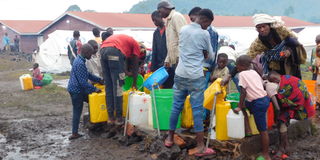Prime
Establish Shs4t govt spends on refugees

Congolese refugees fetch water at Nyakabande refugee transit camp in Kisoro District in October 2023. PHOTO/ROBERT MUHEREZA
What you need to know:
- The issue: Govt expenditure on refugees.
- Our view: Like the vast bulk of Ugandans, we find this unit cost peculiar if not suspicious. We invite the House to do its oversight role by ascertaining its plausibility
Uganda has for years on end been unashamedly proud of its open policy that gives refugees land, education, and a chance to work for good measure.
The largest refugee-hosting country in Africa, with— per the United Nations (UN)—1.5 million displaced persons in its contours as of 2022, Uganda facilitates most—if not all—such people entrusted to its care to live at subsistence level.
Refugees in the country’s rural settlements also receive food aid and health services. This, by any measures and all accounts, has a feel-good glow. The ongoing living costs crisis, however, appears intent on dimming that glow.
As sticky inflation has continued to put pressure on the country’s resources, food rations for refugees have reduced significantly. With budgetary support from various development partners shrinking, a House committee heard last week that careful consideration might have to be given to the inevitable demands to carry out austerity measures.
The warning from Mr Hilary Onek—the Relief, Disaster Preparedness and Refugees minister—had a desperate edge to it. And rightly so. Soaring bills have left the government of Uganda facing an impossible dilemma.
But also it is immediately obvious that the government wants to have its cake and eat it. Worse still, that it wants to use refugees as a bargaining chip.
During an interface last Friday with Mr Jan Sadek, the European Ambassador to Uganda, Minister Onek cited warily—perhaps defensively—that a debt concession would make Kampala amenable to maintaining its open policy for refugees. Just to be clear, there is no shame in this. Most policies are, after all, transactional.
There is, however, a nifty bit of sleight of hand if Uganda’s much-vaunted open policy for refugees is broken down to its constituent parts. There appears to be a lot more than a quid pro quo.
History offers telling support. In 2018, for one, an official inquiry carried out under the auspices of the Office of the Prime Minister (OPM) and the UN refugee agency, UNHCR, unearthed some startling revelations. It was discovered at the time that Uganda played host to 1.1 million refugees rather than 1.4 million.
In a joint statement, the government and UNHCR spotlighted the entry of “some cases of multiple registrations by refugees at the height of the emergency influxes of South Sudanese refugees between mid-2016 and mid-2017.”
Now submissions by the OPM to the House committee on Presidential Affairs indicate that “Uganda contributes and invests an estimated $1.3 billion per year (Shs4.9 trillion) directly and indirectly into the refugee response.” Of this, Shs4 trillion is spent on “wood fuel exploitation” (i.e. firewood)
Like the vast bulk of Ugandans, we find this unit cost peculiar if not suspicious. We invite the House to do its oversight role by ascertaining its plausibility.
On another, if no less economically devastating, note, it beggars belief that the government is not in the habit of exploring cheaper and green options to meet their cooking needs of refugees. This is an extraordinary anomaly that ought to be addressed going forward.




